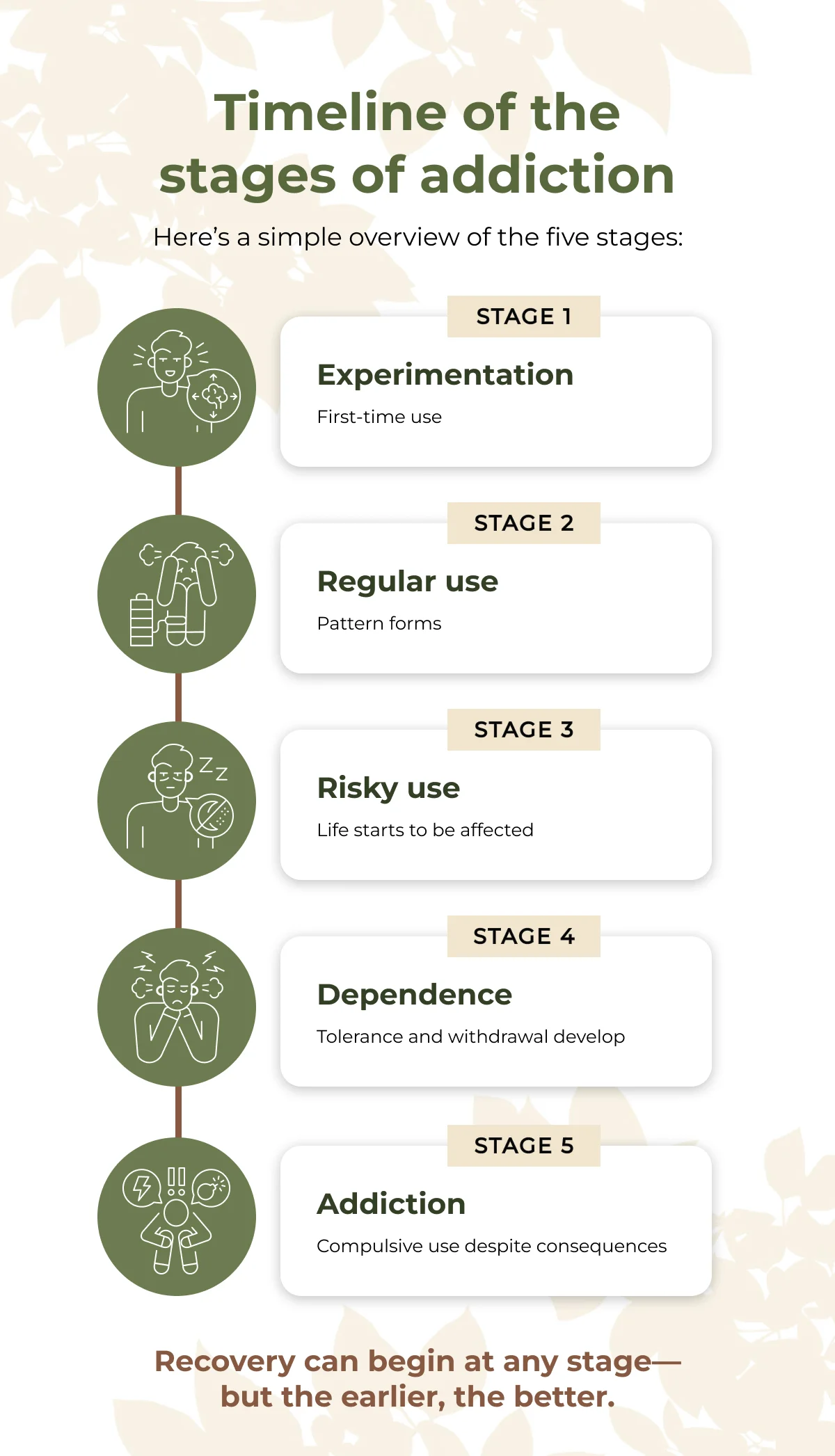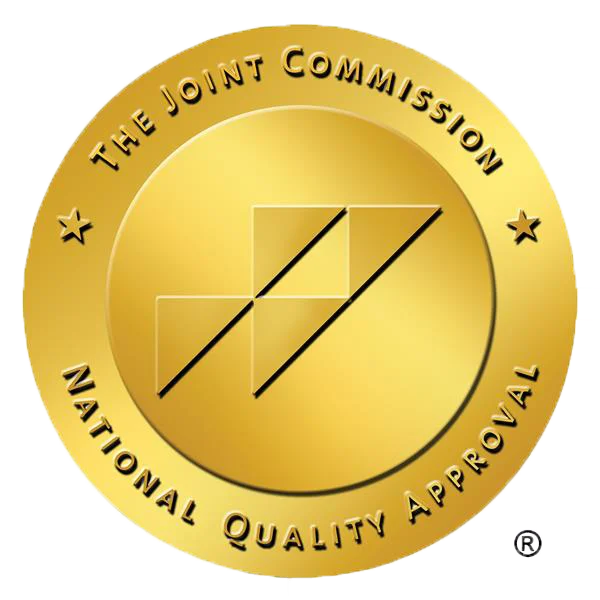Addiction doesn’t happen overnight. It’s a process that develops over time—often without someone even realizing they’re moving deeper into dependence. Whether you’re worried about your own behavior or concerned about someone you love, understanding the stages of addiction can help you recognize the signs early and take steps toward healing.
At Oak Grove Recovery in Westerville, Ohio, we believe that education is the first step toward change. No matter where you or your loved one is in the cycle of addiction, help is available—and recovery is always possible. We invite you to learn more about our addiction treatment programs today.
Every stage of addiction is treatable.
Start healing at Oak Grove Recovery today.
What is addiction?
Addiction, also called substance use disorder (SUD), is a chronic condition that affects the brain’s reward system. Over time, using drugs or alcohol becomes compulsive and difficult to control—even when it causes harm.
Addiction is different from casual or one-time use. It involves tolerance, dependence, and behavioral changes that affect all parts of a person’s life. While substance use starts as a choice, addiction is a medical condition that needs compassionate, evidence-based treatment.
Common substances linked to addiction include:
- Alcohol
- Opioids (e.g., heroin, oxycodone)
- Stimulants (e.g., cocaine, methamphetamine)
- Benzodiazepines (e.g., Xanax, Valium)
- Cannabis
- Prescription medications
If you’re concerned that your use of any of these substances is shifting from casual to frequent, our addiction treatment programs can provide guidance and support.
A deeper look into the five stages of addiction
The stages of addiction can look different for everyone, but most people follow a general pattern of progression. Understanding this pattern can help you spot the warning signs and act before addiction becomes life-threatening.
1. Experimentation
This is the first time someone tries a substance. It might happen out of curiosity, peer pressure, or emotional stress. Use is usually occasional and feels manageable.
Key signs:
- Trying substances socially
- Curiosity or thrill-seeking behavior
- Belief that it’s “just one time”
Recognizing experimentation as the first stage is essential to intervene early and provide support before patterns of use develop further.
2. Regular use
The person begins using substances more frequently—often to relax, manage stress, or cope with emotions. Though they still have some control, risky patterns are starting to form.
Key signs:
- Using on weekends or after work/school
- Using to self-medicate
- Growing secrecy or isolation
At this point, early-stage intervention with outpatient therapy or support groups—like those found in most addiction treatment programs—can help break the cycle.
3. Risky or problematic use
Substance use starts affecting daily life. Work, school, or relationships may suffer. At this stage, the person might deny there’s a problem, even as consequences increase.
Key signs:
- Missing responsibilities due to use
- Driving or working under the influence
- Conflict with loved ones about substance use
A structured program like residential treatment may be necessary to regain control.
4. Dependence
Dependence occurs when the body becomes physically and psychologically reliant on the substance. Tolerance builds, and withdrawal symptoms appear if the person tries to stop.
Key signs:
- Needing more of the substance to get the same effect
- Experiencing withdrawal symptoms (e.g., anxiety, nausea, sweating)
- Using to feel “normal”
Dependence vs. addiction:
Dependence is a physical response; addiction involves both physical and behavioral patterns that cause harm. You can be dependent without being addicted—but addiction usually includes dependence.
If dependence is present, programs that include medical detox or medication-assisted treatment (MAT) can provide essential stabilization.
5. Addiction
At this stage, substance use becomes compulsive and uncontrollable. The person may continue using despite serious consequences to their health, relationships, or safety.
Key signs:
- Multiple failed attempts to quit
- Continued use despite harm
- Feeling unable to cope without the substance
Long-term support through therapy and aftercare services can make sustained recovery possible.

Can you stop addiction at an early stage?
Yes. The earlier someone seeks help, the easier it can be to interrupt the cycle of addiction. Even in the experimentation or regular use stages, talking to a professional or joining a support group can help.
Here’s how support can look at different stages:
- Early stages: Prevention education, counseling, or early intervention
- Risky use: Outpatient care, therapy, or support groups
- Dependence or addiction: Medical detox, inpatient programs, and ongoing therapy
Oak Grove Recovery provides a full continuum of care to support you every step of the way. From medical detox to residential treatment, medication-assisted treatment (MAT), and comprehensive therapy programs, we are here to help you build a foundation for lasting recovery.
Our dedicated team approaches every individual with empathy, respect, and evidence-based care, ensuring you feel supported no matter where you are in your journey. Let us help you take the first step toward a healthier, brighter future.
How can someone tell what stage of addiction they’re in?
It’s not always easy to tell, especially when addiction develops slowly. Here are a few questions that can help:
- Do you find it hard to stop once you start using?
- Have loved ones expressed concern about your use?
- Do you use substances to feel “normal” or avoid pain?
- Have you experienced withdrawal symptoms?
- Are your relationships or responsibilities suffering?
If you answered “yes” to one or more, it may be time to reach out for help. The good news is, you’re not alone—many others face similar challenges, and support is always available to guide you through. Taking that first step can make all the difference.
Can you recover from addiction?
Absolutely. Addiction is a treatable condition. Many people who once felt hopeless now live full, meaningful lives in recovery. With the right support, you or your loved one can build new routines, reconnect with others, and find purpose again.
Recovery often includes:
- Medical detox to manage withdrawal safely
- Inpatient (residential) treatment for structure and stability
- Medication-assisted treatment (MAT) to support long-term recovery
- Therapy programs include individual, group, and family counseling
- Support for co-occurring mental health conditions
- Life skills training and holistic therapies like nutrition and art
- Aftercare planning and relapse prevention strategies
- Therapy (individual, group, family)
- Holistic support (nutrition, mindfulness, art)
- MAT for certain substances
- Aftercare and relapse prevention
At Oak Grove Recovery, we offer a compassionate, trauma-informed space where healing is possible at any stage of addiction. Whether you're just starting to question your use or have tried treatment before, we're here to walk with you. Our addiction treatment programs are here to meet you with care and respect.
Real change begins here
If you’re ready to understand your behavior, support a loved one, or take the first step toward recovery, Oak Grove Recovery is here to help.
Our addiction treatment programs in Westerville, OH, are designed for people just like you—real people facing real challenges. You don’t have to go through this alone. Healing starts now. Call 614.324.8137 or connect with us online to start today.
